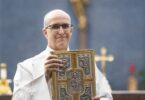
by Leon Suprenant
Curiously, the church celebrates the feast of St. Stephen, the first post-Resurrection martyr, the day after Christmas.
At first glance, this feast may seem odd because of the stark contrast between the joy of Bethlehem and the violent stoning of St. Stephen.
The church considers the day of martyrdom a birthday. Because of Christ’s death and resurrection, the death of the martyr is a birth into eternal life.
That’s why we celebrate the first martyr the day after Christmas: Christ was born to die, so that those who unite their death to his might be born again into eternal life.
But who was St. Stephen?
He was one of the “seven men of good repute” (Acts 6:3) chosen by the apostles to assist them in their ministry.
A strong tradition, dating back to the second century, sees the origin of the diaconate in the institution of “the seven” in the Acts of the Apostles. Among them, St. Stephen is the best known and most beloved.
We know that “the seven” were appointed to assist with the daily distribution to the Greek-speaking widows. Certainly there was an element of “service” involved, so that the apostles could devote themselves to prayer and ministry of the word (Acts 6:4).
Yet, there was more going on here than meets the eye. At the time of Acts, readers would have understood the “daily distribution” as entailing the “daily preaching of the word.”
The apostles were preaching in the temple and in people’s homes in Aramaic (cf. Acts 5:42), so the Greek-speaking widows were missing out on this.
Immediately after the appointing of “the seven,” the word of God increased and the number of disciples multiplied greatly (Acts 6:7).
It should be noted that in Scripture “the seven” don’t address people’s need for earthly food but, rather, their need for the Gospel.
We see this not only in the eloquent testimony and eventual martyrdom of St. Stephen in Jerusalem in Chapter 7 of the Acts, but also in the evangelistic work of Philip the Evangelist (another deacon) in Samaria in Chapter 8 of the Acts.
This fulfills the progressive mission that the disciples bear witness to Jesus first in Jerusalem, then “throughout Judea and Samaria, and to the ends of the earth” (Acts 1:8).
Some scholars have interpreted the “daily distribution” of “the seven” in Chapter 6 of the Acts in light of Chapter 2, Verse 46, of the Acts (“they devoted themselves . . . to breaking bread in their homes”), asserting that the deacons’ mandate had a connection not only to the proclamation of the word, but also to the Eucharist.
But whatever the exact mission of the first deacons might have been, there is no doubt that on Dec. 26 we celebrate the “birthday” of St. Stephen into eternal life.
May our celebrations this season be ever mindful of our own new birth — the ultimate Christmas gift — made possible by the Christ Child.

